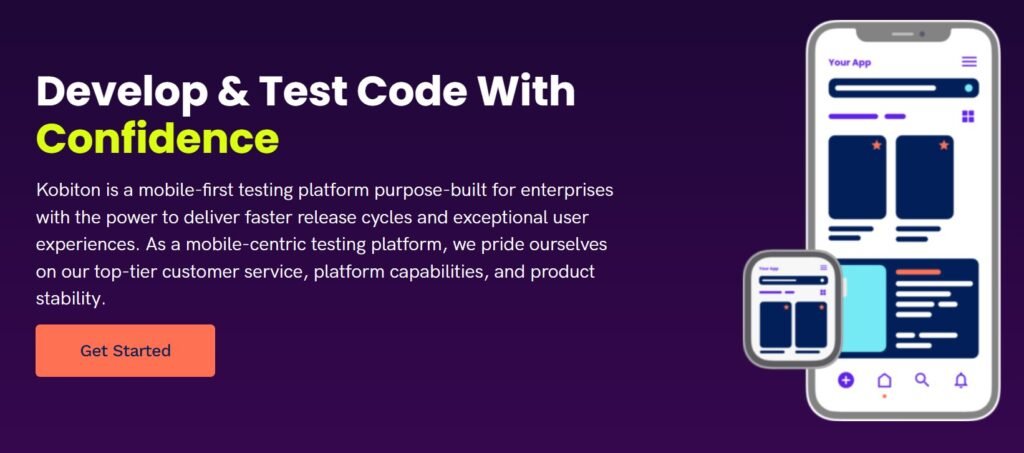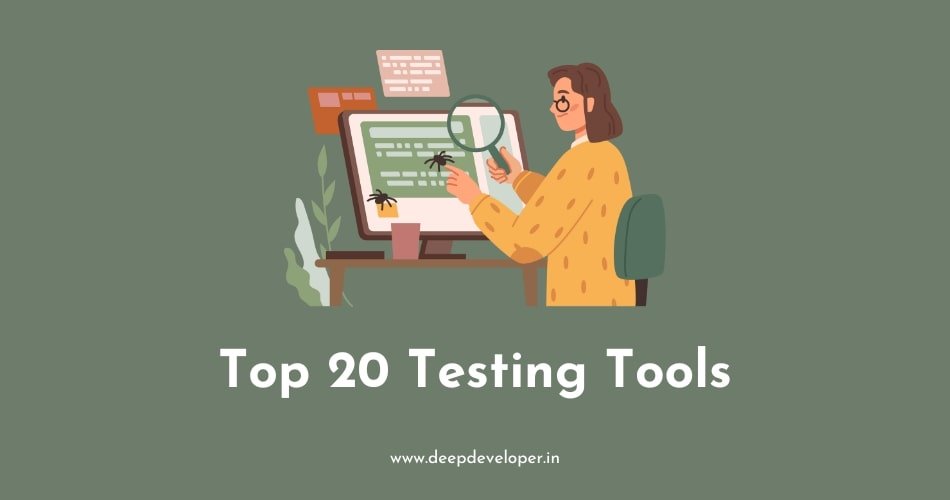Software testing is a critical process in software development that ensures the software meets the expected quality standards before its release. In 2023, there are numerous automation tools available for software testing, each with unique features and benefits. In this blog, we will discuss the top 20 automation tools in 2023 for software testing.
What is Software Testing?
Software testing is the process of evaluating and verifying software products or applications to ensure that they meet the specified requirements and quality standards. It involves checking the functionality, performance, usability, security, and other aspects of the software to identify and fix defects, bugs, or errors.
The goal of software testing is to ensure that the software is of high quality, reliable, and meets the needs of end-users. Software testing is a critical process in the software development life cycle, and it helps to minimize risks, reduce costs, and improve the overall quality of the software.
What are Testing Tools?
Testing tools are software programs that help software developers and testers perform different types of testing, such as unit testing, integration testing, system testing, and acceptance testing. These tools help automate testing tasks, making it easier to detect defects and ensure software meets quality standards.
There are two main categories of testing tools:
- Static Test Tools: Static test tools analyze the software’s source code without executing it. These tools can detect defects in the early stages of the software development life cycle.
- Dynamic Test Tools: Dynamic test tools analyze software code as it executes. These tools are useful in finding issues that are not easily visible just by looking at the source code.
Mobile Testing Tools
With the increasing popularity of mobile devices, mobile testing tools have become essential for software testing. These tools help testers automate testing on mobile devices and ensure the app works on different platforms and devices. Some popular mobile testing tools are:
#1 Appium
Appium is an open-source tool that allows testers to automate testing of mobile apps on both Android and iOS devices. It supports several programming languages, including Java, Ruby, Python, and more.

Features of Appium:
- Cross-platform testing for Android and iOS devices
- Support for web and native apps
- Integration with popular testing frameworks
- Robust reporting and debugging capabilities
#2 Espresso
Espresso is an Android-specific testing tool that provides a fast and reliable way to automate testing of Android apps. It supports testing user interactions and UI components.
Features of Espresso:
- UI testing for Android apps
- Integration with Android Studio and Gradle
- Flexible testing options for different use cases
- Advanced debugging and reporting features
#3 Perfecto
Perfecto is a cloud-based mobile testing tool that allows testers to automate testing on real mobile devices across various platforms. It supports both manual and automated testing.

Features of Perfecto:
- Cross-platform testing for iOS, Android, and web applications
- Access to real devices in the cloud
- Advanced testing and debugging capabilities
- Integration with popular testing frameworks
#4 ExperiTest
ExperiTest is a mobile testing tool that provides a range of testing services, including manual testing, test automation, and performance testing. It supports various platforms, including Android and iOS.
Features of ExperiTest:
- Cross-platform testing for mobile apps
- Support for manual and automated testing
- Advanced test automation features
- Integration with popular testing frameworks
#5 Robotium
Robotium is a popular Android testing tool that provides a simple and intuitive way to automate testing of Android apps. It supports black-box testing, UI testing, and functional testing.
Features of Robotium:
- Automated testing for Android apps
- Support for different testing scenarios
- Easy-to-use API for test development
- Integration with popular testing frameworks
API Testing Tools
API testing tools are essential for testing the functionality and performance of an application’s API. These tools help automate testing of the API and ensure it meets the expected quality standards. Some popular API testing tools are:
#6 SoapUI
SoapUI is an open-source tool that helps to test SOAP and REST APIs. It supports both manual and automated testing and allows testers to create complex test scenarios.

Features of SoapUI:
- Automated testing for SOAP and REST APIs
- Flexible testing options for different scenarios
- Customizable reporting and analysis
- Integration with popular testing frameworks
#7 SOAPSonar
SOAPSonar is a testing tool that supports SOAP and REST API testing. It provides a range of features, including automated testing, security testing, and performance testing.
Features of SOAPSonar:
- Automated testing for SOAP and REST APIs
- Advanced security testing and analysis
- Performance testing capabilities
- Integration with popular testing frameworks
#8 WebInject
WebInject is a free open-source testing tool that supports HTTP and HTTPS testing. It supports both manual and automated testing and allows testers to create complex test cases.
Features of WebInject:
- Automated testing for HTTP and HTTPS applications
- Customizable test case development
- Reporting and analysis capabilities
- Integration with popular testing frameworks
#9 Tricentis
Tricentis is a comprehensive API testing tool that provides a range of features, including automated testing, API monitoring, and performance testing.

Features of Tricentis:
- Automated testing for APIs
- Advanced testing options for different scenarios
- API monitoring and analysis
- Integration with popular testing frameworks
Automated Testing Tools
Automated testing tools help testers automate testing tasks and improve testing efficiency. Some popular automated testing tools are:
#10 Avo Assure
Avo Assure is a codeless testing tool that allows testers to automate testing without writing code. It supports different platforms and applications, including web and mobile apps.
Features of Avo Assure:
- Codeless testing for different applications
- Integration with popular testing frameworks
- Advanced reporting and analysis
- Support for different testing scenarios
#11 Kobiton
Kobiton is a cloud-based mobile testing tool that allows testers to automate testing on real devices. It supports both manual and automated testing and provides advanced testing capabilities.

Features of Kobiton:
- Automated and manual testing for mobile apps
- Access to real devices in the cloud
- Advanced testing and debugging capabilities
- Integration with popular testing frameworks
#12 Parasoft Continuous Quality Suite
Parasoft Continuous Quality Suite is an end-to-end testing tool that supports different types of testing, including unit testing, integration testing, and system testing. It provides advanced testing capabilities and integration with popular tools.
Features of Parasoft Continuous Quality Suite:
- Comprehensive testing for different types of applications
- Advanced testing options for different scenarios
- Integration with popular testing frameworks and tools
- Advanced reporting and analysis
#13 ZAPTEST
ZAPTEST is an automation testing tool that allows testers to create and execute different types of tests, including functional, regression, and data-driven testing. It supports different platforms and applications.

Features of ZAPTEST:
- Automated testing for different applications
- Support for different testing scenarios
- Integration with popular testing frameworks
- Advanced reporting and analysis
#14 Selenium
Selenium is a popular automation testing tool that supports different types of testing, including functional, regression, and data-driven testing. It supports different programming languages and browsers.

Features of Selenium:
- Automated testing for different applications
- Support for different programming languages
- Integration with popular testing frameworks
- Advanced reporting and analysis
#15 QTP
QTP is a comprehensive automation testing tool that supports different types of testing, including functional, regression, and performance testing. It provides advanced testing capabilities and integration with popular tools.
Features of QTP:
- Comprehensive testing for different types of applications
- Advanced testing options for different scenarios
- Integration with popular testing frameworks and tools
- Advanced reporting and analysis
Defect Tracking Tools
Defect tracking tools help testers track defects and manage them throughout the software development life cycle. Some popular defect tracking tools are:
#16 JIRA
JIRA is a popular issue tracking tool that allows testers to track defects, bugs, and other issues throughout the software development life cycle. It provides advanced features for project management and collaboration.
Features of JIRA:
- Issue tracking and management
- Project management and collaboration
- Integration with popular testing frameworks and tools
- Advanced reporting and analysis
#17 MantisHub
MantisHub is an open-source issue tracking tool that allows testers to track defects and manage them throughout the software development life cycle. It provides advanced features for collaboration and customization.
Features of MantisHub:
- Issue tracking and management
- Project management and collaboration
- Customization options for different use cases
- Integration with popular testing frameworks and tools
#18 FogBugz
FogBugz is a comprehensive issue tracking and project management tool that allows testers to track defects, bugs, and other issues throughout the software development life cycle. It provides advanced features for collaboration and automation.
Features of FogBugz:
- Issue tracking and management
- Project management and collaboration
- Automation options for different use cases
- Integration with popular testing frameworks and tools
#19 Bugzilla
Bugzilla is an open-source issue tracking tool that allows testers to track defects and manage them throughout the software development life cycle. It provides advanced features for customization and collaboration.
Features of Bugzilla:
- Issue tracking and management
- Customization options for different use cases
- Collaboration features for team communication
- Integration with popular testing frameworks and tools
#20 BugNet
BugNet is an open-source issue tracking tool that allows testers to track defects and manage them throughout the software development life cycle. It provides advanced features for customization and collaboration.
Features of BugNet:
- Issue tracking and management
- Customization options for different use cases
- Collaboration features for team communication
- Integration with popular testing frameworks and tools
Also Read:
Conclusion
In conclusion, there are numerous automation tools available for software testing in 2023, each with unique features and benefits. It is important to choose the right tool based on your testing needs and requirements. Whether it’s mobile testing, API testing, automated testing, or defect tracking, there are tools available to make the process easier and more efficient. By using the right tools and techniques, software developers and testers can ensure software meets quality standards and performs as expected.
FAQs: Testing Tools
Testing tools help software developers and testers to improve the efficiency and accuracy of software testing. These tools can automate repetitive testing tasks, identify defects and bugs earlier in the development cycle, and ensure that software meets quality standards.
When choosing a testing tool, it’s important to consider your testing needs and requirements. You should also consider factors like ease of use, cost, support, and integration with other tools and frameworks.
Yes, you can use multiple testing tools for different types of testing. Using the right tools for each testing task can help to improve testing efficiency and accuracy.
The level of programming knowledge required to use testing tools varies depending on the tool. Some tools require advanced programming knowledge, while others require no programming knowledge at all. It’s important to choose a tool that matches your skill level and experience.

